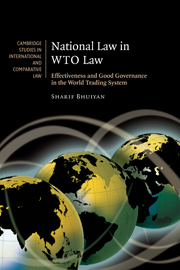Book contents
- Frontmatter
- Contents
- Acknowledgements
- List of abbreviations
- 1 Table of GATT cases
- 2 Table of WTO cases
- 3 Table of other cases
- 1 Introduction
- Part I
- 2 National law in international law
- 3 Systemic WTO obligations regarding national law
- 4 WTO dispute settlement procedures and national law
- Part II
- References
- Index
4 - WTO dispute settlement procedures and national law
Published online by Cambridge University Press: 23 February 2010
- Frontmatter
- Contents
- Acknowledgements
- List of abbreviations
- 1 Table of GATT cases
- 2 Table of WTO cases
- 3 Table of other cases
- 1 Introduction
- Part I
- 2 National law in international law
- 3 Systemic WTO obligations regarding national law
- 4 WTO dispute settlement procedures and national law
- Part II
- References
- Index
Summary
Introduction
The last chapter examined the systemic framework of interaction between WTO law and national law. The present chapter turns to the institutional framework of that interaction. On the institutional side, it is, as already noted in the introductory chapter, the WTO's unique dispute settlement mechanism that makes the interaction highly prominent as well as important from a policy point of view. Systemically, the supremacy of WTO norms (flowing, inter alia, from Article XVI:4 of the WTO Agreement), coupled, of course, with their extensive coverage, sets limits, more than any other contemporary international treaty, on the policy choices of national law-makers and other authorities. And, institutionally, it falls, in large measure, upon the WTO dispute settlement organs to oversee whether national constituencies (legislative, administrative or judicial) are respecting those limits. The reasons for this have already been touched upon. To recall, because of characteristics such as compulsoriness, exclusivity and automaticity, the WTO dispute settlement system is used truly extensively. Thus, in case of disagreement between Members as to whether a national law or other measure has transgressed the limits set by the WTO treaty, it is often the dispute settlement organs which, as third party arbiters, have the last word.
On occasion, the application of WTO norms to national laws by these organs even evokes the idea of a national (constitutional) court applying constitutional norms to inferior laws. A good example of this is provided by the parallel cases before the US courts and the WTO regarding a law enacted by the US state of Massachusetts, namely the Act Regulating State Contracts with Companies Doing Business with or in Burma (Myanmar).
- Type
- Chapter
- Information
- National Law in WTO LawEffectiveness and Good Governance in the World Trading System, pp. 86 - 118Publisher: Cambridge University PressPrint publication year: 2007



